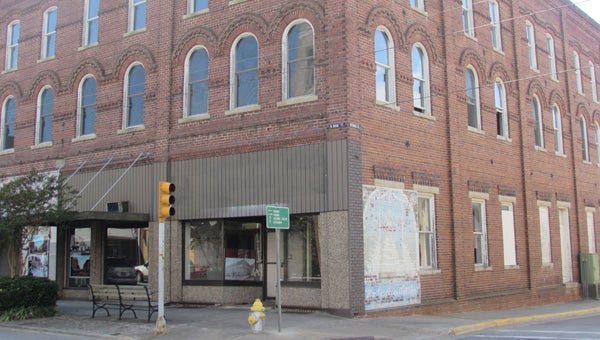Fowle Building could house brewpub
Published 7:03 pm Friday, December 19, 2014

FILE PHOTO | DAILY NEWS
CHANGES: Renovations to the old Fowle Building could indicate the structure is being prepared to house a brewpub and apartments.
A company that operates at least one restaurant and a microbrewery in eastern North Carolina is interested in bringing similar establishments to Washington, according to John Rodman, director of community and cultural resources for Washington.
During the Historic Preservation Commission’s meeting earlier this month and in a subsequent telephone call, Rodman confirmed that a Morehead City-based company is considering the Fowle Building on Main Street as a possible site to house a microbrewery. Rodman identified the company as Tight Lines Pub & Brewing Co.
“As far as I know, they’re still active,” Rodman about the company pursuing a site in Washington.
Klew, LLC is the parent company of Tight Lines Pub & Brewing Co., according to the N.C. Secretary of State Department’s records. Betty Sue Stroud is listed as the LLC’s registered agent and as manager/member, and Russell Lewis is listed as a manager/member, according to a report filed July 30 with the department.
Klew, LLC’s creation documents were filed with the department May 3, 2011.
In recent weeks, several attempts to contact Lewis have been unsuccessful.
Klew, LLC operates Queen Anne’s Revenge restaurant in Beaufort and Tight Lines Pub & Brewing Co. in Morehead City. The Beaufort restaurant features craft beers from small breweries across the nation.
“Micro-brewing is a growing business sector nationally, and a proven means of economic development across North Carolina. There is evidence that micro-breweries revitalize distressed areas, promote tourism, and are excellent candidates for adaptive reuse of buildings in central business districts like Washington,” wrote Rodman, the city’s community and cultural services director, in a memorandum to Mayor Mac Hodges and the City Council earlier this year. “Micro-breweries have a successful business model that enables these businesses and neighboring businesses to grow without major impacts on public safety.”
Rodman wrote that allowing microbreweries in the city would “encourage this type of use and investment in certain Washington commercial districts while maintaining the protection of lower-intensity commercial districts from large-scale industrial-type uses.”
In October, the council amended the city’s zoning code to allow microbreweries in certain commercial districts.
The amendment defines a brewery, microbrewery, tap room and brewpub. It also creates specific criteria for each of those uses.
• Brewery — manufactures malt liquors (beer and ales) in excess of 15,000 barrels (a barrel is about 31 gallons) a year.
• Microbrewery — manufactures malt beverages on the premises and produces less than 15,000 barrels of malt liquor a year. Microbreweries provide areas for on premise consumption, education, retail sales or other accessory uses.
• Taproom — an area that is necessary for a microbrewery where the public may purchase and/or consume on the beer produced on site. A taproom is considered an accessory use to a microbrewery.
• Brewpub — a combination brewery, restaurant and/or pub. Beer is brewed for consumption on the premises and served with food. A brewpub is considered an accessory use to a microbrewery.
With the change to the zoning code, breweries are allowed as a permitted use in the heavy industrial and light industrial zoning districts. Microbreweries are allowed as a special use in the business historic and general business districts. The city’s Board of Adjustment would issue special-use permits for microbreweries, which would be required to meet specific criteria before receiving a permit. The Board of Adjustment determines those specific criteria.
The following are special criteria required for a microbrewery to receive a special-use permit:
• The permit is valid for one year and must be renewed annually.
•Required to include one or more accessory uses such as a taproom, restaurant or other use incidental to the microbrewery and accessible to the public. The taproom shall have a minimum of 500 square feet.
• A microbrewery production area cannot exceed 7,500 square feet of gross floor space. Microbreweries adaptively reusing buildings within a National Register Historic District are exempt from size limitations for all portions of the building existing at the time the zoning code was amended.
• The permitted use must be a minimum of 200 feet from any church or religious institution, public or private school and day care facility.
• The Board of Adjustment may require other conditions as it deems necessary to ensure the proposed project is compatible with the city’s land-use and comprehensive plans.
Earlier this month, the Historic Preservation Commission voted 3-2 to allow New Vision Partners LLC to install balconies on certain areas of the second and third floors of the building.
The balconies plan, according to Trent Tetterton, who addressed the commission concerning the balconies, calls for several of the building’s windows to be replaced by doors and for the doors to open to balconies. Justin Fejfar, registered agent for New Vision Partners, which is based in Raleigh, filed the request for the certificate of appropriateness. Tetterton, an official with the Washington Harbor District Alliance, has played a part in helping find buyers and/or developers for downtown properties.
In November 2013, the Morehead City Planning Board endorsed a request by Klew, LLC to amend that city’s zoning ordinances to allow microbreweries as a defined special use in that city’s downtown business district. The Morehead City Council had final say on changing the zoning ordinance, which it did. Klew, LLC bought and remodeled the former Rap’s Grill and Bar, opening Tight Lines Pub & Brewing Co. in the remodeled building.
The Tight Lines Pub & Brewing Co. page on Facebook may be accessed at www. facebook.com/tightlinesbrewing.






